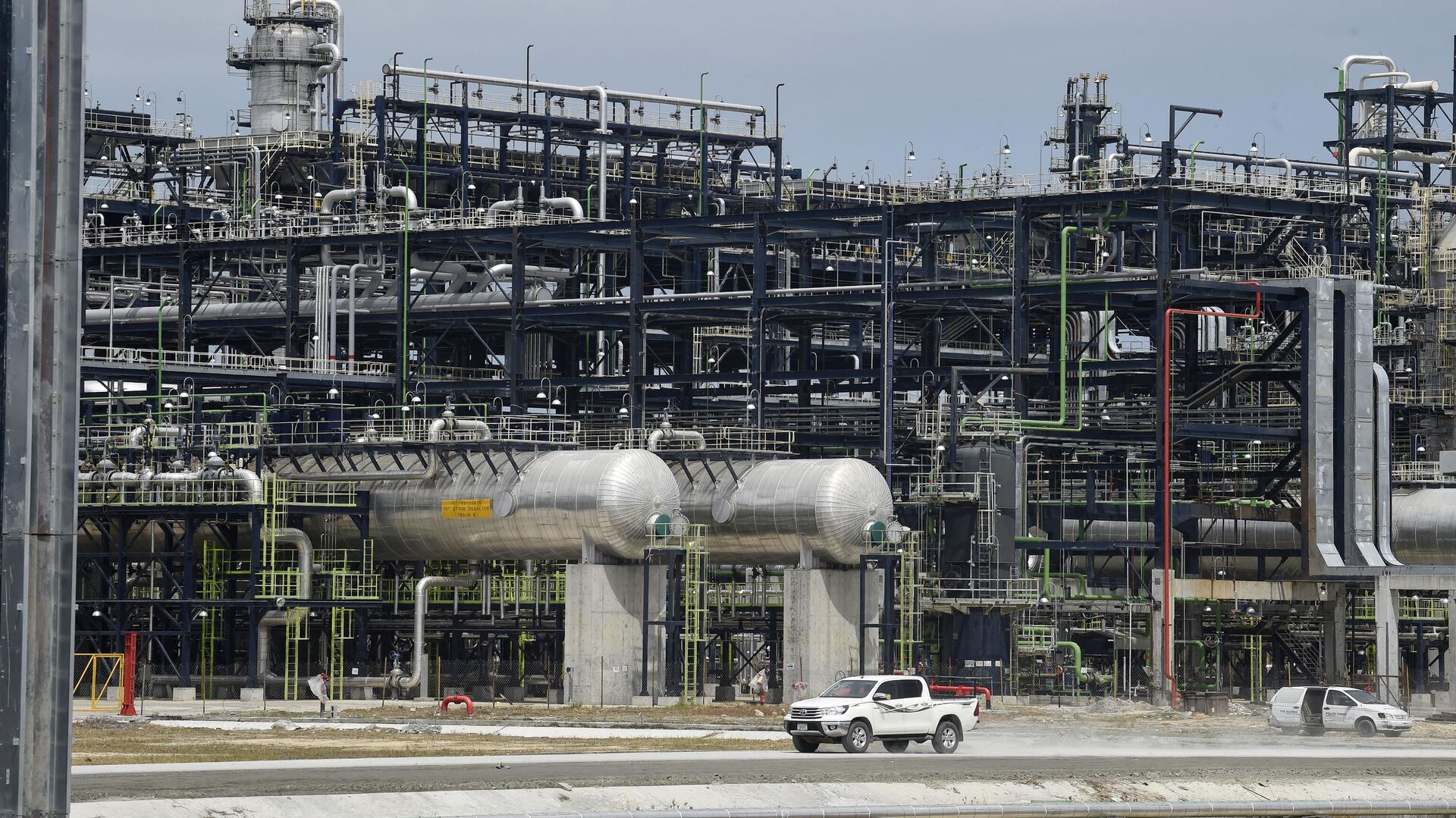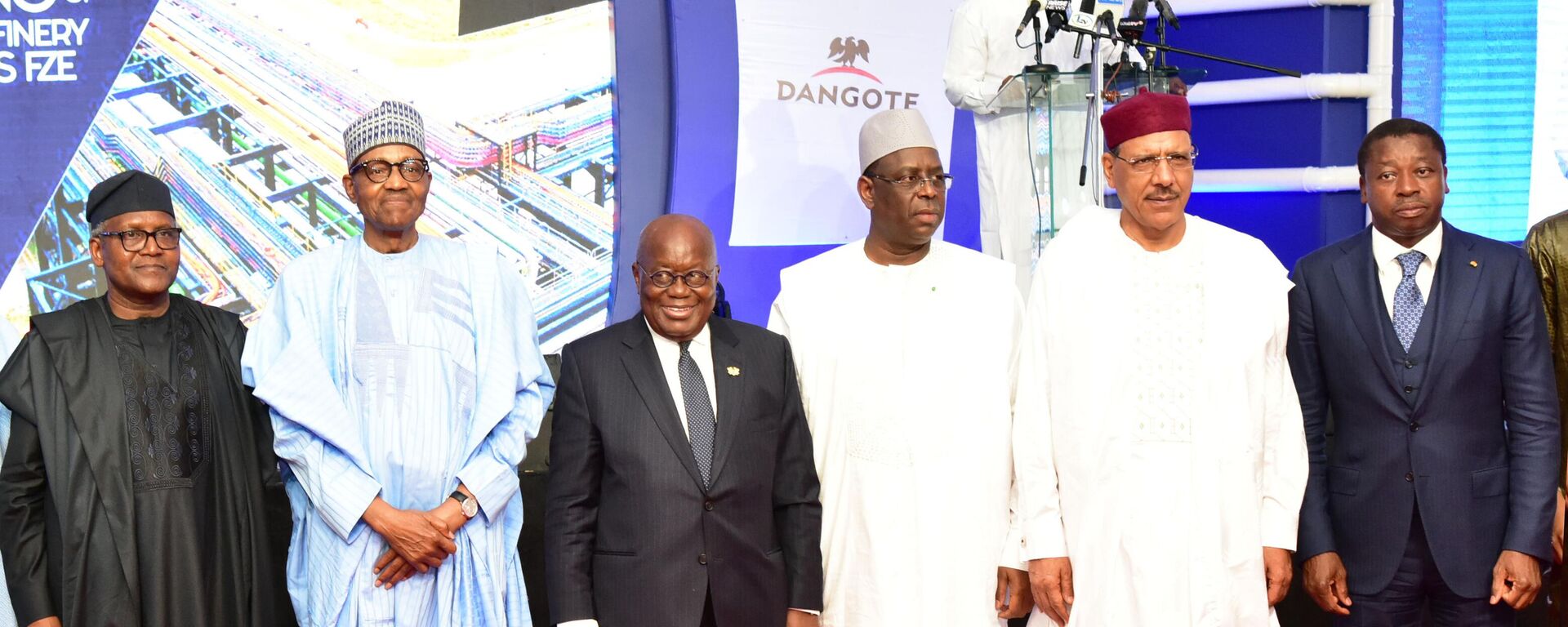https://en.sputniknews.africa/20231105/nigeria-on-track-to-end-fuel-imports-dangote-refinery-begins-test-runs-1063333697.html
Nigeria on Track to End Fuel Imports: Dangote Refinery Begins Test Runs
Nigeria on Track to End Fuel Imports: Dangote Refinery Begins Test Runs
Sputnik Africa
With a capacity of 650,000 barrels per day, the Dangote refinery is expected to revolutionize the oil trade in the region and reduce the dependence of Nigeria... 05.11.2023, Sputnik Africa
2023-11-05T11:59+0100
2023-11-05T11:59+0100
2023-11-05T11:59+0100
sub-saharan africa
nigeria
west africa
oil
fossil fuels
lagos
economy
https://cdn1.img.sputniknews.africa/img/07e7/0b/05/1063334712_0:317:3076:2047_1920x0_80_0_0_4dbdda0a035b762c41ce9b98e236209b.jpg
Nigeria's NNPC Ltd, the country's sole licensed oil company, will supply the newly established Dangote Oil Refinery with up to six cargoes of crude oil for test runs in December, according to Western media reports citing industry sources.Located in the Lekki free trade zone near Nigeria's economic capital, Lagos, the refinery, when fully operational, is expected to make Nigeria a net exporter of processed fuels.While details of the agreement remain confidential, other sources indicated plans for 4-5 cargoes or a minimum of 130,000 barrels per day. Gasoline and diesel purchases will be negotiated separately in future contracts between Dangote Group and the NNPC, which has a 20% stake in the project.The Dangote refinery, financed by Africa's richest man, Aliko Dangote, was commissioned in May after significant delays and a cost overrun of $19 billion, exceeding the original estimate of $12-14 billion. The commissioning process involves testing and ensuring the proper functioning of various units that produce different petroleum products. The transition from test runs to full capacity production of high quality fuels can take several months.Experts believe that as the refinery reaches full capacity, the value of the fuels it produces will improve. To sustain operations, the refinery will need to process about 325,000 barrels of crude oil per day, or about 10 cargoes per month, according to Jeremy Parker, head of business development for Africa-focused oil consultancy CITAC. In later phases, the refinery is expected to operate at 650,000 barrels per day.The Nigerian Minister of State for Petroleum Resources, Heineken Lokpobiri, has stated that the Dangote refinery, in addition to other smaller refineries in Nigeria, will enable the country to stop importing fuel by next year.
https://en.sputniknews.africa/20230525/game-changer-experts-stress-significance-of-dangote-refinery-opening-for-nigeria-and-africa-1059467733.html
nigeria
west africa
lagos
Sputnik Africa
feedback@sputniknews.com
+74956456601
MIA „Rossiya Segodnya“
2023
Muhammad Nooh Osman
https://cdn1.img.sputniknews.africa/img/07e7/04/0a/1058467512_0:0:1280:1280_100x100_80_0_0_ec723833bcbfcaed2e21952965ad99e4.jpg
Muhammad Nooh Osman
https://cdn1.img.sputniknews.africa/img/07e7/04/0a/1058467512_0:0:1280:1280_100x100_80_0_0_ec723833bcbfcaed2e21952965ad99e4.jpg
News
en_EN
Sputnik Africa
feedback@sputniknews.com
+74956456601
MIA „Rossiya Segodnya“
Sputnik Africa
feedback@sputniknews.com
+74956456601
MIA „Rossiya Segodnya“
Muhammad Nooh Osman
https://cdn1.img.sputniknews.africa/img/07e7/04/0a/1058467512_0:0:1280:1280_100x100_80_0_0_ec723833bcbfcaed2e21952965ad99e4.jpg
nigeria, west africa, oil, fossil fuels, lagos, economy
nigeria, west africa, oil, fossil fuels, lagos, economy
Nigeria on Track to End Fuel Imports: Dangote Refinery Begins Test Runs
Muhammad Nooh Osman
Writer/Editor
With a capacity of 650,000 barrels per day, the Dangote refinery is expected to revolutionize the oil trade in the region and reduce the dependence of Nigeria and other African countries on fuel imports from Europe and North America, which have traditionally dominated the African fuel market.
Nigeria's NNPC Ltd, the country's sole licensed oil company, will supply the newly established
Dangote Oil Refinery with up to six cargoes of crude oil for test runs in December, according to Western media reports citing industry sources.
Located in the Lekki free trade zone near Nigeria's economic capital, Lagos, the refinery, when fully operational, is expected to make Nigeria a net exporter of processed fuels.
The initial contract with NNPC is for six cargoes or 200,000 barrels per day, with the potential for future volumes based on mutual agreement and availability, the media reported, citing an unnamed NNPC official.
While details of the agreement remain confidential, other sources indicated plans for 4-5 cargoes or a minimum of 130,000 barrels per day. Gasoline and diesel purchases will be negotiated separately in future contracts between Dangote Group and the NNPC, which has a 20% stake in the project.
The Dangote refinery, financed by
Africa's richest man, Aliko Dangote, was commissioned in May after significant delays and a cost overrun of $19 billion, exceeding the original estimate of $12-14 billion. The commissioning process involves testing and ensuring the proper functioning of various units that produce different petroleum products. The transition from test runs to full capacity production of high quality fuels can take several months.
Experts believe that as the refinery
reaches full capacity, the value of the fuels it produces will improve.
To sustain operations, the refinery will need to process about 325,000 barrels of crude oil per day, or about 10 cargoes per month, according to Jeremy Parker, head of business development for Africa-focused oil consultancy CITAC. In later phases, the refinery is expected to operate at 650,000 barrels per day.
The Nigerian Minister of State for Petroleum Resources, Heineken Lokpobiri, has stated that the Dangote refinery, in addition to other smaller refineries in Nigeria, will enable the country to
stop importing fuel by next year.
"The Port Harcourt Refinery when completed is expected to produce about 54 to 60 barrels per day, while Warri refinery when it comes on stream by February, 2024 will produce 75 barrels of oil per day. If we add that to Dangote refinery we will be able to stop fuel imports and Nigeria can now have the benefits of full deregulation," Lokpobiri said in late August.



